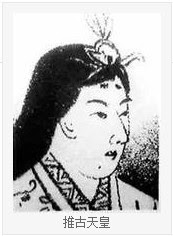Late sixth century and early seventh century were a period of paradigm shift for the early history of Japan. Justice was power earlier than this period in Japan. The Imperial family of Japan also obtained and stabilized its power using military force. They defeated many local tribes and formed unified Japan. When Empress Suiko (554 - 628) became the highest ruler position of Japan, most of Japan was under control of Yamato government. As they did not have any enemy country that was an immediate threat to Yamato government, higher position aristocrats and imperial family member were fighting for political power.
Yamato government needed new concept to reign peaceful Japan. Empress Suiko appointed Prince Shotoku as her regnant. Prince Shotoku decided to introduce constitutional government system from China and sent his mission to then Chinese emperor. Based on the knowledge and experience from the people sent to China, Prince Shotoku could establish the twelve official ranks for modernization of Yamato government. He promulgated Seventeen-articles constitution. Prince Shotoku successfully modified his government to be modern, centralized, and constitutional, based on the concept and knowledge introduced from China. Noteworthy is the fact that he could accomplish this modernization despite all power struggles in Imperial Palace in Japan, at that time.
 Prince Shotoku took all the credit for modernization of Japan in the seventh century including promulgation of the very first constitution of Japan. It might not have been possible that Prince Shotoku achieved establishment of the first central government by himself in the midst of bloodshed power struggle. Empress Suiko must have given full support to her regnant to realize modern central government.
Prince Shotoku took all the credit for modernization of Japan in the seventh century including promulgation of the very first constitution of Japan. It might not have been possible that Prince Shotoku achieved establishment of the first central government by himself in the midst of bloodshed power struggle. Empress Suiko must have given full support to her regnant to realize modern central government.Quite unfortunately, there is no record to show how Empress Suiko supported Prince Shotoku. However, in the period when just survival was not easy, Empress Suiko must have been a determined and strong-minded lady. There is a myth, which tells what kind of person Empress Suiko was. According to the legend, Umako, who was the head of the most powerful political family, at the same time, uncle of the queen wanted her to approve ownership of a royal land. The empress rejected her uncle's request. She said royal land belonged not just to royal family, but also to the people. She continued that Japanese people would have hated them both, if she accepted his request of giving people's property to him, all because she is the empress and he was her uncle and the leader of the most powerful clan.
She does not appear much in official records, but she must have been quiet but strong leader in the paradigm shift age.
Read this Article in EzineArticles.com:
http://EzineArticles.com/5514324
It's NEW! It's exciting!! It brings you the result!!! Web Traffic Toolbox!!!
http://webtraffictoolbox.com/

Check my websites to find out what I am doing:
http://vur.me/shawfunami/me
http://vur.me/shawfunami/zi
Feel free to contact me:
shaw@zhenintl.ws
Shaw Funami
Fill the Missing Link


No comments:
Post a Comment